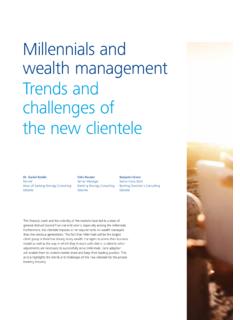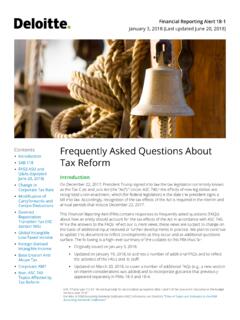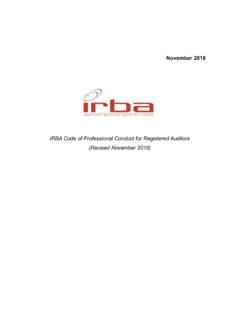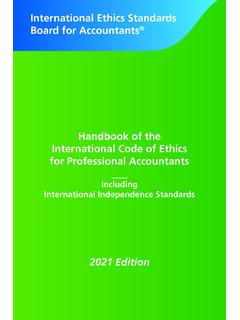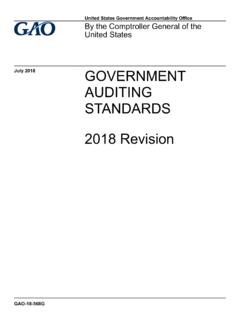Transcription of Appointment of the audit committee and independence …
1 1 NextAppointment of the audit committee and independence requirements2 NextPreviousAppointment of the audit committee The King Code of Governance Principles and the King Report on Governance (King III) emphasises the vital role of an audit committee in ensuring the integrity of financial controls and integrated reporting, and identifying and managing financial risk. This sentiment is echoed in the Companies Act, 2008 (Act No 71 of 2008) (the Companies Act or the Act). The Appointment of an audit committee is regulated as part of the enhanced accountability and transparency requirements set out in Chapter 3 of the Companies Act (Chapter 3).
2 The Companies Act requires certain categories of companies to appoint an audit committee . Public companies and state owned companies must appoint an audit committee . In addition, any other types of companies (private company, personal liability company or non-profit company) that provide for the Appointment of an audit committee in their Memorandum of Incorporation must comply with the relevant provisions of the Act to the extent provided for in the Memorandum of Incorporation. In our experience, very few private companies choose to include a requirement in its Memorandum of Incorporation for the Appointment of an audit committee .
3 Notwithstanding the requirements of the Companies Act, King III proposes that ALL companies should have an audit committee . The Companies Act states that, where the Appointment of an audit committee is required, the audit committee must be appointed by the shareholders at every annual general meeting. This means that the Appointment of the audit committee becomes an annual event. This requirement highlights the importance of the board s nomination committee . As all audit committee members must be directors (members of the board), it is important that the nominations committee identifies suitably skilled and qualified individuals to nominate for Appointment to the audit committee .
4 Of course, the shareholders may appoint any director they deem fit and 94 of the Companies Act determines that the audit committee must consist of at least three members who must be directors of the company and not: be involved in the day to day management of the company for the past financial year; be a full-time employee for the company for the past 3 financial years; be a material supplier or customer of the company such that a reasonable and informed third party would conclude in the circumstances that the integrity, impartiality or objectivity of that director is compromised by that relationship; and be related to anybody who falls within the above requirements of section 94 are prescriptive.
5 It would appear that should the company appoint an audit committee with persons other than those prescribed, it would not be an audit committee as required by the Companies Act. As a result, any functions undertaken by a non-compliant (that is an improperly constituted ) audit committee will not have been performed by the audit committee as required by the Companies Act. This may impact the actions of the committee , and may even result in liability for the committee audit committee can consist of as many members as the company wishes to appoint (but at least three), but each member must meet the criteria and must be a director of the company.
6 The audit committee may utilise advisors and obtain assistance from other persons inside and outside of the company. The audit committee may also invite knowledgeable persons to attend its meetings. However, the formally appointed members of the audit committee entitled to vote and fulfil the functions of the audit committee will have to meet the criteria (non-executive independent directors) in accordance with the prescribed requirements. 3 NextPreviousEthical leadership and social responsibility is highlighted in King III. These same sentiments are echoed in the Companies Act. Although it may be argued that the provisions of the Companies Act are onerous and prescriptive, it should be acknowledged that the intention is for the audit committee to play a key role in ensuring accountability and transparency.
7 As an independent, objective body, it should function as the company s independent watchdog to ensure the integrity of financial controls, combined assurance, effective financial risk management, and meaningful integrated reporting to shareholders and stakeholders III proposes that every company appoints an audit committee comprising at least three independent non-executive directors. The JSE requires listed companies to appoint an audit committee in compliance with the King III. With regard to the composition of the audit committee , the committee must comprise at least three independent non-executive directors.
8 If an issuer has an independent non-executive chairman of the board, he/she may be a member of the audit committee , subject to the following provisions: all the other members of the audit committee (at least two) are independent non-executive directors he/she may not be the chairman of the audit committee the dual role (chairman of the board and member of the audit committee ) is specifically disclosed to shareholders at the annual general meeting referred to in Section 94(2) of the Act, and shareholders approve the Appointment of the chairman to the audit committee at the annual general of audit committee membersThe independence of audit committee members should be subject to review at least annually and more often as necessary.
9 Companies that are required, in terms of the Companies Act, to appoint an audit committee should have policies in place to facilitate timely identification of changing relationships or circumstances that may affect the independence of audit committee members. Many companies require directors to complete an independence questionnaire when appointed to the board and annually thereafter, and to notify the company of any changes that may affect independence . For audit committee members, these questionnaires should be tailored to reflect the independence criteria set out in principle of King III and the Companies Act, as summarised below.
10 Companies may want to involve legal counsel in assessing the independence of directors. Regardless, the Companies Act requires the annual Appointment of the audit committee , which provides an ideal opportunity for the nominations committee to re-assess the independence of the audit committee this regard, cognisance should be taken of the position of shareholders as potential members of the audit committee . The Companies Act makes no reference to shareholding as a disqualification from membership of the audit committee , and the value judgment pertaining to independence relates only to suppliers and customers.
